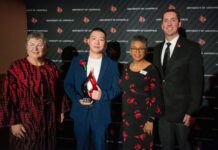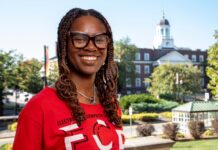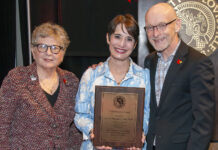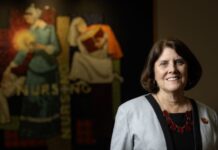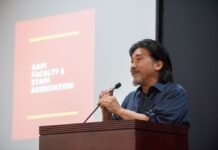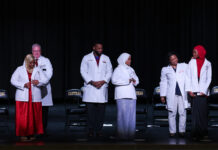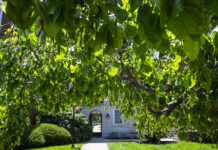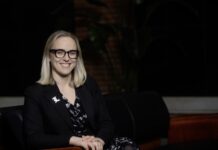
When Dom McShan came on board at UofL’s Cultural Center, his focus was on programming and student success. Two years later, that focus remains laser sharp.
McShan, who is the programming director and oversees the African American Male Initiative, has added a bevy of signature programs to the Cultural Center’s schedule, including the Civil Rights Bus Tour, performing arts night during Black History Month, diversity dialogue series and the Fall Fest Multicultural Expo.
“Signature programming was always my objective because it helps us serve a dual responsibility – to serve as an inclusive body on campus and to increase student success, retention and graduation rates,” McShan said. “Personally, I want to increase engagement on campus. There are silos here and that comes with higher education, but building networks and meeting people make a huge difference and I want to help our students learn how to do that.”
One of his mentors, Tierney Bates, UofL’s former Cultural Center director who is now the assistant vice chancellor for Student Affairs at North Carolina Central University, helped him network here once he arrived on campus. In fact, McShan said Bates is the reason he ended up at UofL to work toward his master’s degree. While he was an undergraduate student at LSU, McShan met Bates at a conference and the two hit it off.
“I saw a young man who needed the right environment to hone his skills and develop him into a rock star. During my first phone conversation with Dom I had a gut feeling that this guy is the right person for the Cultural Center and the right person students would be attracted to work with,” Bates said. “Dom is very engaging and understands student development theory, understands the needs of underrepresented students, can speak to programming impact, and has the ability to walk through many doors on a personal and professional level in relating to people.”
Once he settled in at the Cultural Center, McShan’s first line of business was to benchmark programs that were successful at other institutions, including LSU. He also leveraged his networking skills to take new programs to the next level; for example, the Anne Braden Institute pitched in resources for the successful Civil Rights Bus Tour, and the Native American Student Organization helped facilitate the first signature Native American heritage event organized by the Cultural Center last year.
“The goal is to expand and cover more identity groups, but everything comes down to resources, budget and student interest and participation. We need student buy-in. Last year, we had that with the Native American event, which brought in different nations with different traditions and it was a big deal and very successful,” McShan said. “We were able to do that because of our connections with the student organization.”
The event was not held again during the fall semester, but he hopes to bring it back next year. Transitions in student leadership of RSOs pose a challenge with programming, he admits.
“I want to make sure smaller groups are represented,” McShan said. “With manpower and financial resources, these goals have been challenging so we have to think about other ways to come together and support each other. Collaboration is a big goal of mine; I want to foster more collaboration among multicultural student organizations.”
Collaboration tends to yield impact, which is what motivates McShan.
“When I organize an event and I am personally impacted, or I hear folks saying ‘Wow, I didn’t know that’ – that is what drives me to do this work,” he said. “That Native American Heritage Event is a great example. I never knew there were different traditions within different tribes. On my own journey, I am still learning so much.”
African American Male Initiative
During the summer 2017, McShan’s roles increased to include overseeing the AAMI, which was created in 2011 with a specific objective of “increasing retention, persistence, graduation, engagement and overall success of African American males by addressing various scholastic and social challenges through academic engagement, mentoring, peer connection and student involvement.”
The “mentoring” part comes naturally for McShan, who is pursuing a master’s of education degree in counseling and personnel services with a concentration on college student personnel. The subject matter has taught him how to take a holistic and institutional approach to his AAMI work.
“The data shows that these students’ issues aren’t always about academic performance. A student could have a strong GPA and SAT score, but they still are at risk for dropping out or not graduating. We have to look at what else is going on – are there personal problems, financial problems, are they having a hard time getting through processes like FAFSA,” he said. “A lot of these students just don’t have guidance. They’re first generation students and sometimes they’re going through very significant things.”
Historically, African American male college completion rates are lowest among both sexes and all racial/ethnic groups in the U.S. To help with retention and success rates, the AAMI program includes a dedicated advisor who has a high-level view of the student’s grades and who helps the student get connected with the necessary campus resources.
“Being a first generation kid himself and navigating his higher education experience is part of the reason I wanted him to work for me,” Bates said about McShan. “Those who can share similar experiences with our students and work with them are the ones who get the most out of our students, become role models, parental figures and more.”
In April, McShan will lead a group of at least 10 students to a Students of Color Conference in Clemson. Some of them will even have the opportunity to speak. The Cultural Center is planning fundraisers to offset their costs, including an awards banquet and gala in February. Aside from this trip, McShan’s other major goal is fundraising for year-round programming.
“The New Year will be spent trying to figure out how to expand what we’re doing, but with reduced resources,” he said. “I don’t want to just expand, though. I want to ensure our programs are sustainable and we have a foundation that, even when I leave, they’ll be in place.”
That’s not to say he’s leaving anytime soon, however.
“I eventually want to get back to Texas, which is much closer to home. But for now I plan on staying here. I have to see these initiatives through,” McShan said.
Bates has big expectations for McShan, calling him the “next big talent to work in higher education.”
“He will be a VP or top faculty one day at an institution or my chief of staff,” he said. “Dom McShan is a gem and the University of Louisville better do all it can to keep him.”



